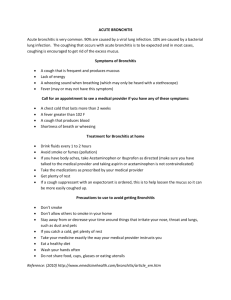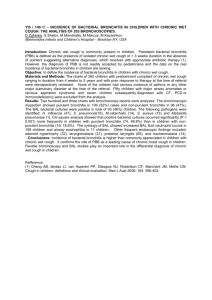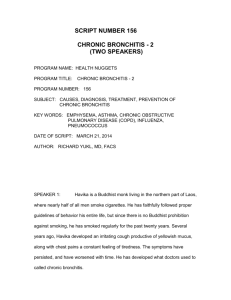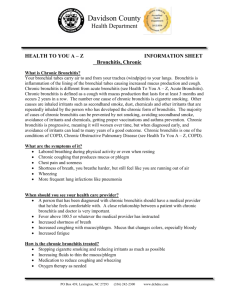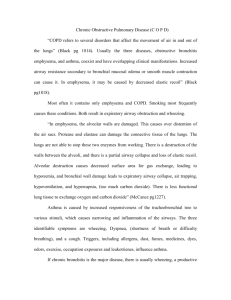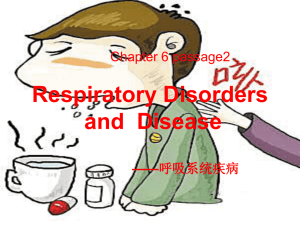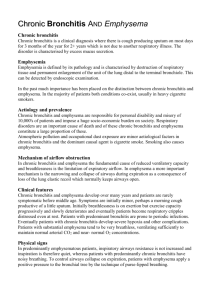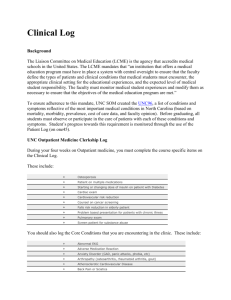script number 156 chronic bronchitis
advertisement
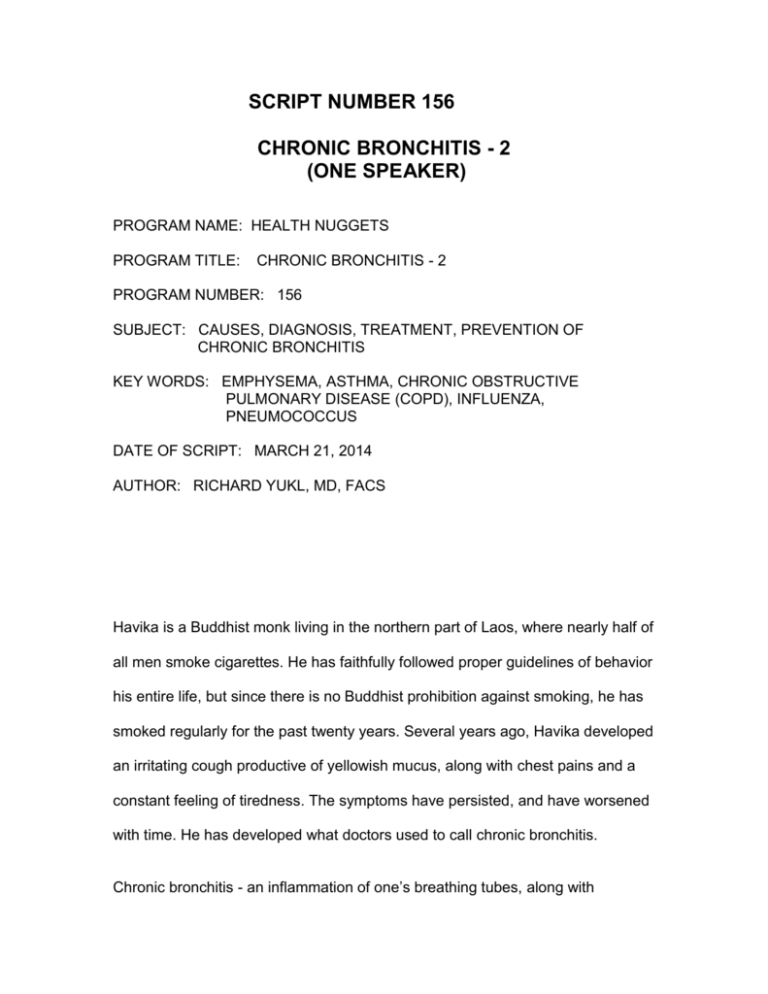
SCRIPT NUMBER 156 CHRONIC BRONCHITIS - 2 (ONE SPEAKER) PROGRAM NAME: HEALTH NUGGETS PROGRAM TITLE: CHRONIC BRONCHITIS - 2 PROGRAM NUMBER: 156 SUBJECT: CAUSES, DIAGNOSIS, TREATMENT, PREVENTION OF CHRONIC BRONCHITIS KEY WORDS: EMPHYSEMA, ASTHMA, CHRONIC OBSTRUCTIVE PULMONARY DISEASE (COPD), INFLUENZA, PNEUMOCOCCUS DATE OF SCRIPT: MARCH 21, 2014 AUTHOR: RICHARD YUKL, MD, FACS Havika is a Buddhist monk living in the northern part of Laos, where nearly half of all men smoke cigarettes. He has faithfully followed proper guidelines of behavior his entire life, but since there is no Buddhist prohibition against smoking, he has smoked regularly for the past twenty years. Several years ago, Havika developed an irritating cough productive of yellowish mucus, along with chest pains and a constant feeling of tiredness. The symptoms have persisted, and have worsened with time. He has developed what doctors used to call chronic bronchitis. Chronic bronchitis - an inflammation of one’s breathing tubes, along with emphysema and asthma - inflammation the lungs themselves, have all recently been renamed chronic obstructive pulmonary diseases or COPD. The inflammation found in these diseases is the body’s defense against exposure to an irritating substance for long periods of time. Today, I want to specifically talk about chronic bronchitis. In this aspect of COPD, inflammation of the cells that line the breathing tubes causes the tubes to swell, interfering with one’s ability to breathe air into and out of their lungs. It also causes a cough that may be productive of mucus, just as it did with Havika. Other symptoms of chronic bronchitis may include chest pain, chronic tiredness, and sometimes fevers with chills. The inflammation and its symptoms can last for years, as long as the irritation remains. Chronic bronchitis is a serious medical condition. Swelling that prevents air from flowing freely into our lungs can make us feel miserable, cause us to have shortness of breath, and cause severe wheezing as we breathe. The productive cough caused by the inflammation can interfere with our sleep. It can also lead to fevers serious enough to require medical attention. It is important for one to be aware of COPD, and about inflammation of the breathing tubes in particular. The World Health Organization estimates that, worldwide, COPD in all of its forms affects 64 million people, and that it kills 3 million people every year - that’s one person every 10 seconds! It will soon become the third leading cause of death around the world. Half of all people who develop chronic bronchitis will die of the disease within ten years. In addition to that, people with the condition often suffer severe limitation of their lifestyle. As an example, they may have to struggle to get enough air just to do simple tasks such as to walking up short flights of stairs. The most important risk factor for developing chronic bronchitis is smoking cigarettes. Over 90 percent of patients with the disease have a smoking history, as does Havika. Air pollution, dust and poisonous gases in the environment or workplace are other important risk factors. Chronic bronchitis can develop in people who have previously had normal breathing tubes, but who have suffered repeated infections by the viruses that cause the common cold or influenza. At the least, these repeated infections will worsen symptoms of chronic bronchitis that may already be present. Other risk factors include working around such lung irritants as grains and chemical fumes. Diagnosis of chronic bronchitis is made by a test in which you blow into a machine that measures how much air your lungs can hold, and how quickly you can push the air out of your lungs. Chronic bronchitis is preventable, but unfortunately, it cannot be cured once you have it. The disease process will worsen over time even though treatment can help to slow its progression. Treatment focuses on relieving symptoms and making breathing easier. If you smoke, you must stop. You will be taught how to change your breathing patterns to allow more air to reach your lungs. Such a breathing exercise program will improve your tolerance for physical activity. You will also be taught how to use warm, moist air to help relieve your cough and loosen mucus in your breathing tubes. You will be advised to wear a facemask when you are exposed to air that is polluted or when you are exposed to irritants such as paint or household cleaners, which give off strong fumes. If cold air worsens your cough and increases your shortness of breath, you will be instructed to wear a facemask when going outdoors. Your doctor may prescribe medicines you can breathe in through your nose to reduce inflammation and open the swollen passages to your lungs. He may also prescribe antibiotics to reduce your risk of a serious, secondary bacterial infection. Cough medicines that you can buy without a prescription may be helpful if coughing disturbs your sleep, but because coughing helps remove irritants from your lungs and breathing tubes, it's best not to stop a cough that effectively brings up mucus. God created our lungs as a delicate mechanism that allows our body to absorb the oxygen it needs to work efficiently. Once a disease such as chronic bronchitis damages that delicate mechanism, no treatment can fully repair the damage. The smartest thing we can do is to consciously work at reducing our risk of developing chronic bronchitis in the first place. Follow these recommendations: Avoid smoking cigarettes. Smoking significantly increases one’s risk of developing chronic bronchitis. It is an addiction that is difficult to break, so, if you smoke, look for a local public health department or a church in your area that conducts “Stop Smoking” classes to help you quit. Havika found such a program, and his symptoms have improved. Next, wash your hands with soap before eating. That will kill the viruses that cause the repeated colds and pneumonia that can result in chronic bronchitis. Finally, get vaccinated against influenza and Pneumococcus, the organisms that are the most frequent cause of lung infections. Health Nuggets is written by Dr. Richard Yukl, a medical doctor working in the United States. The medical views expressed in this program are his and may differ for your particular health needs. If you need medical advice, please consult a medical professional in your area.
